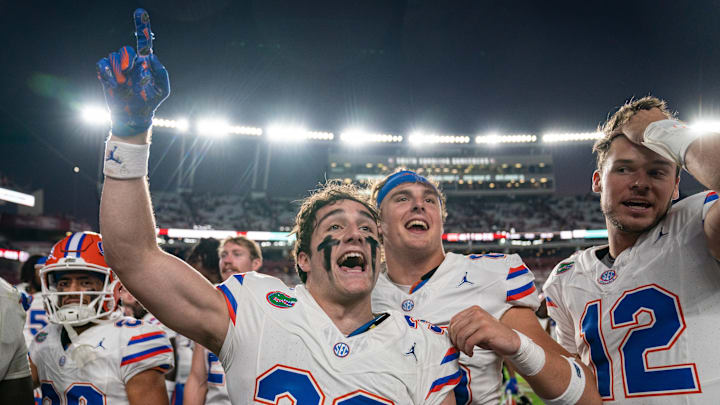Big-time college football has become a Wild West situation, marked by new rules for name, image, and likeness (NIL), where players now receive salaries from schools, and the transfer portal, which enables student-athletes to move from one school to another from year to year.
This new anything-goes-era of major college football has former University of Florida gridiron players a bit concerned about the state of the game and lost loyalty to one team. The NCAA’s power programs now resemble pro teams. Some even describe it as NFL Jr.
“NFL Jr.? No.” said Jon Xynidis, who played safety and special teams for the Gators from 1994-97. “I think it’s the NFL with no rules. No salary cap, trade rules, nothing.”
Former Florida Gators express views on NIL
Beginning this season, athletic programs will be allowed to share revenue directly with their athletes. Based on a court-ordered mandate, every school will be allowed a cap of $20.5 million in direct payments to athletes in the first year, increasing by 4 percent every season for the next 10 years.
Former UCLA basketball player Ed O'Bannon is widely considered the Father of NIL. He fronted a lawsuit in 2015 that eventually led to players taking control of their NIL, which opened the door for athletes to lend their name to products and services for profit.
It’s a far cry from John Schnebly’s college experience. Schnebly was the Gators backup quarterback and placeholder under head coaches Ray Graves (1968-69) and Doug Dickey (1970-71).
“When I played, I got what I bargained for,” said the 75-year-old Gator pigskin alum. “I got a good education. They fed me and took care of me. Whether I needed new shoes or to fix a broken leg, the Gators took care of it.”
“Am I jealous of these guys? I don’t know,” he added. “I guess maybe a little bit. To me it seems like these rules make it very difficult to coach because you don’t know what players you’re going to have from year to year.
“These days they can leave and go play someplace else if they want. Maybe they get a little better offer, and they are gone. So, there’s no loyalty. It’s all about what each individual gets. It’s definitely different.”
John Schnebly played quarterback and was placeholder for the Gators from 1968-71. pic.twitter.com/PmkQ9WbvV5
— #GodwinKelly (@godwinkelly) June 27, 2025
Xynidis, 49, played for legendary Head Coach Steve Spurrier, who advocated for player pay in the 1990s. The Gators won the SEC Championship each year Xynidis was on the team. UF captured the NCAA National Championship in 1996. No big money was being tossed around in those days.
“We struggled in college,” he said. “We got a stipend for food and for rent. You had to have a side job to get out to dinner or go on a date or whatever it was. It wasn’t easy living but it was part of the experience so I appreciated it.
“Would have been a different experience if I had been given $5,000 a month? Yeah. I can see why they did this because the schools were profiting off the players and the players deserved to share in that. But I can see that a lot of the sacred stuff about college football may be gone. Back when I played it the big thing was (college programs) turning boys into men. Now when schools recruit players, the players ask, ‘How much am I going to get paid?’ That part is unfortunate.”
Jon Xynidis played safety and special teams for the Gators from 1994-97. He was part of the 1996 National Championship team. pic.twitter.com/bEXYb3DoBn
— #GodwinKelly (@godwinkelly) June 27, 2025
Seemingly gone are the days of developing a high school athlete with potential into a stellar player. Schnebly believes some football coaches have left the game because of these new rules.
“Because it’s too difficult to work your butt off to get good players, then somebody offers them some more money and they go off down the road after you spent all that time to get the player to a certain level,” he said. “It’s definitely going to change things, well, it already has to some degree. I guess people will have to adjust to it.”
Xynidis agreed and cited this recent example.
“What bugs me is the freedom players have to move from team to team,” he said. “Take, for example, the Florida basketball team. There was a kid, Denzel Aberdeen, who just transferred to Kentucky for his senior season. He was sure to be a starter next season for the Gators. So, Florida will be playing against him next year after winning the National Championship this year. That part of it is heartbreaking to me.”
The NCAA approved a $2.8 billion settlement via the House v. NCAA antitrust lawsuit. The money will be used to pay former athletes, who were denied NIL opportunities. This applies only to athletes who played from 2016 to 2024. Neither Schnebly nor Xynidis are eligible for compensation.
“Before 2015, you’re out of luck,” Xynidis said. “It is what it is. I’m not looking for money. My knees and shoulders hurt but I appreciate what I got (when I was playing) and what I put into the University of Florida.
“I was there at a really good time. We won four SEC Championships and an NCAA Championship, so that was a great experience. To me it’s all about experiences and that experience can’t be replaced and can’t be bought. Well, I guess, now it can be bought (laugh).”
